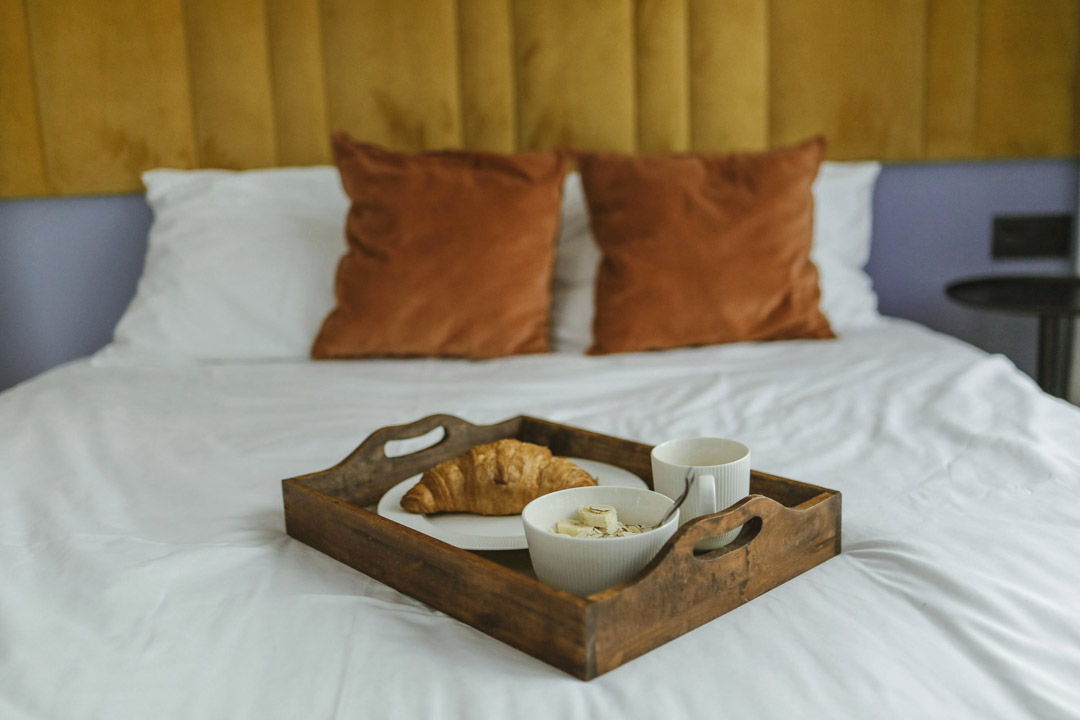Starting a Bed and Breakfast (B&B) is not just about opening a lodging facility; it’s about creating a unique experience for guests. This venture is particularly appealing in today’s market where travellers are increasingly seeking personalised, intimate, and authentic travel experiences.
According to recent statistics, the global bed and breakfast market has been experiencing a steady growth, reflecting a shift in traveller preferences towards more unique and localised accommodations.
A survey by the Association of Bed and Breakfasts revealed that over 70% of guests choose B&Bs for their unique charm and personalised service. In this dynamic market, starting a B&B can be a fulfilling and lucrative venture, especially if you have a passion for hospitality and enjoy interacting with diverse people.
However, like any business, it requires careful planning and execution. This guide provides a detailed pathway to help you navigate the process of opening and successfully running your own B&B.
What Is a Bed and Breakfast?
A bed and breakfast, commonly abbreviated as B&B, is a type of lodging or accommodation that offers overnight stays and breakfast to guests. B&Bs are typically smaller, privately-owned establishments, often located in charming and picturesque settings, such as historic homes, countryside cottages, or quaint inns.
The allure of B&Bs is evident in their ability to offer a more personal touch than traditional hotels, something that modern travellers, especially millennials and Gen Z, highly value.

Indeed, research findings indicate that bed and breakfast establishments outperform hotels in the UK when it comes to guest ratings. Bed and breakfast properties consistently achieve guest ratings of approximately 89.6%, while hotels tend to receive ratings of around 80.8%. This disparity can be attributed to the personalised and attentive service that guests experience at bed and breakfast establishments.
How Do You Know If Owning a Bed and Breakfast Is Right for You?
Owning a bed and breakfast (B&B) can be a rewarding but demanding venture. To determine if it’s the right path for you, you need to ask yourself these 10 questions first:
- Do you have a genuine passion for hosting and providing excellent hospitality?
- Are you prepared for the long hours, including weekends and holidays?
- Can you handle the physical and mental demands? Are you good at dealing with pressure?
- Are you comfortable with financial planning, marketing, and operations management?
- Will you be able to handle the administrative aspects efficiently?
- Are you willing to invest in renovations, repairs, and regular upkeep to provide an inviting space for guests?
- Do you have marketing skills or the willingness to learn?
- Are you financially stable enough to cover initial expenses and potential periods of lower occupancy?
- Do you have a good understanding of the region where your B&B is located?
- Are you comfortable with varying guest personalities and preferences?
- Are you willing to navigate and comply with regulations, such as permits, licences, and inspections?
- Are you willing to try new strategies and technologies to achieve success?

What Are Pros and Cons of Owning a Bed and Breakfast?
Owning a bed and breakfast can indeed offer an idyllic lifestyle, but it’s important to note that it’s a 24/7 job and demands your full attention. There can be pros and cons to this type of business, and understanding them is essential for anyone looking into how to start a bed and breakfast business. Let’s take a look.
Pros:
- You get to live on-site, enjoy your property, and interact with travellers from around the world.
- B&B owners have the creative freedom to decorate and design their property according to their vision and style.
- A well-managed B&B can generate a steady income stream. It can be a profitable business, especially in tourist destinations.
- Owners can engage with neighbours, support local businesses, and contribute to the community’s growth.
- You enjoy the freedom that accompanies being your own boss.
Cons:
- Owners often work long hours, including weekends and holidays, to ensure guest satisfaction.
- Guests may be present at all hours, limiting your personal space.
- Income can be seasonal, with peak tourist periods and quieter off-seasons. Managing finances during slow months can be challenging.
- B&Bs are subject to various regulations and licensing requirements, which can vary by location. Compliance can be time-consuming and costly.
- The demanding nature of the business can lead to burnout if owners don’t prioritise self-care and work-life balance.

Is Running a Bed and Breakfast a Profitable Endeavour?
Whether or not bed and breakfasts are profitable depends on a number of factors, making it hard to give a simple yes or no answer. Under the right circumstances, B&Bs can be very profitable.
With good management, pricing, and marketing, they can achieve healthy profit margins around 20-30%. On the other hand, it’s not a guaranteed get-rich-quick scheme. It takes hard work, dedication, and a genuine passion for hospitality to build a successful B&B.
According to AirDNA, the average annual revenue for a B&B in the United States is $185,000. HomeAway and Vrbo report similar figures, at $150,000 and $170,000 respectively. The average occupancy rate for a B&B in the United States is around 62.33%. This means that on average, a B&B room is booked and occupied for about 62% of the nights in a year.
However, profitability of a B&B can be affected by a number of factors, including location, property features, amenities, pricing, marketing, and management skills.
B&Bs in popular tourist destinations tend to be more profitable than those in less-frequented areas. B&Bs with unique or charming features, such as historical significance or beautiful gardens, can also command higher prices and attract more guests.
How Much Does It Cost to Start a Bed and Breakfast?
Starting a bed and breakfast (B&B) entails various costs, with the total investment depending on several factors. Key considerations include the property’s location, size, and condition, with properties in prime tourist areas typically commanding higher prices. Renovations and compliance with permits and licences may also contribute to costs.
Moreover, furnishing and decorating guest rooms, along with marketing efforts, are significant expenses. Additionally, operational costs, safety measures, and reserve funds should be factored in.
A well-structured business plan is crucial to estimate the initial investment accurately, which can range from tens of thousands to millions of pounds and varies depending on individual circumstances and location.
Low-End:
In some cases, it may be possible to initiate a B&B with minimal renovations and using existing furniture, but this scenario is rare and often comes with compromises on guest comfort and amenities, requiring an investment of around $10,000.
Mid-Range:
For more typical B&Bs with comfortable accommodations and effective marketing strategies, the startup cost range typically falls between $50,000 and $100,000.
High-End:
In the case of luxurious B&Bs located in prime destinations, requiring extensive renovations and significant branding efforts, the startup costs can easily exceed $200,000.

Starting a Bed and Breakfast: A Step-by-Step Guide
1. Craft Your Vision:
- Identify your ideal location and target audience (families, couples, adventurers).
- Define your B&B’s unique selling point: charming historic house, gourmet breakfasts, eco-friendly practices.
- Determine the demand for B&B accommodations in your chosen location and assess local competition.
2. Do the Financial Analysis:
- Create a detailed business plan and financial projections.
- Research startup costs including property, renovations, permits, supplies, and marketing.
- Secure funding through savings, loans, or investors.

3. Find Your Perfect Pad:
- Choose a property that complements your vision and accommodates your number of guests.
- Consider existing B&B regulations and zoning restrictions in your chosen location.
- Consider the renovation requirements and potential expenses for ongoing maintenance.
4. Take Care of Legalities and Licences:
- Register your business and obtain necessary permits and licences based on your location.
- Get liability insurance to protect yourself against guest accidents or property damage.
- Research local tax regulations and ensure compliance.
5. Build Your Ideal Retreat:
- Renovate guest rooms and common areas to be comfortable, inviting, and reflect your brand.
- Invest in high-quality linens, towels, furniture, and amenities.
- Create a welcoming atmosphere with personal touches and local details.
6. Breakfast with a Twist:
- Design delicious and memorable breakfast menus featuring local ingredients and dietary options.
- Consider offering cooking classes or in-room breakfast deliveries for an extra touch.
- Make every meal an experience that sets your B&B apart.
7. Promote Your Bed & Breakfast:
- Develop a strong online presence with a website, social media channels, and listing on booking platforms.
- Partner with local tourism boards and businesses for cross-promotion opportunities.
- Offer attractive packages and deals to attract guests and fill vacancies.
8. Welcome with Open Arms:
- Provide excellent customer service with personalised attention and local recommendations.
- Train your staff (if any) to be friendly, professional, and knowledgeable about the area.
- Gather guest feedback and use it to continuously improve your services and offerings.

9. Embrace Technology:
- Utilise booking and reservation software to streamline guest interactions and manage your calendar.
- Offer contactless check-in and payment options for added convenience.
- Connect with guests through online platforms and respond promptly to inquiries and reviews.
Why Is a Strategic Business Plan Essential for a Bed and Breakfast Business?
A Bed and Breakfast (B&B) business plan is essential as it acts as a strategic roadmap for establishing and managing the business. It outlines objectives, strategies, and operational procedures, aligning every aspect of the B&B with its overall goals. This clarity is crucial for effective management and team direction.
Additionally, the plan is vital for financial oversight, providing detailed revenue, expense, and profitability projections, which are key to maintaining a healthy cash flow and long-term sustainability in the hospitality industry.
Furthermore, a well-crafted business plan is indispensable for attracting investors and securing financing, demonstrating the viability and profit potential of the B&B. It includes market analysis, helping to understand the competitive landscape and target market, which is crucial for developing effective marketing strategies and differentiating the B&B in a competitive market.
Overall, a business plan is a dynamic tool that guides decision-making and helps the business adapt to market or industry changes. Here is a free template for a business plan:
How Can You Effectively Sell Your Bed and Breakfast?
Get Financials in Order:
Gather and organise your financial records, including tax returns, income statements, and expense reports. Consistent profitability and growth make your B&B more attractive.
Conduct a Valuation:
Consult a professional to get an accurate valuation of your property and business. This helps set a realistic asking price and informs negotiations.
Prepare the Property:
Enhance curb appeal with landscaping, fresh paint, and minor repairs. Stage the interior with inviting decor and guest amenities.

List with B&B Specialists:
Consider listing your B&B with real estate agents specialising in B&B or hospitality properties. They have market knowledge and networks to reach potential buyers.
Craft a Compelling Listing:
Create a detailed and professional listing showcasing your B&B’s unique selling points, beautiful photos, and positive guest reviews.
Leverage Online Marketing:
Utilise online platforms like dedicated B&B listing websites, social media, and targeted online advertising to reach your ideal buyer.
Show, Don’t Tell:
Host open houses or individual buyer tours to allow potential buyers to experience the charm and atmosphere of your B&B firsthand.
Highlight Profitability:
Clearly present your financial records and revenue growth, emphasising the B&B’s potential as a successful business venture.
Be Flexible & Strategic:
Be prepared to negotiate on price and terms, but don’t undervalue your B&B. Consider offering payment plans or creative financing options to attract buyers.
Gather Referrals:
Talk to other B&B owners who have sold their properties and ask for recommendations on agents, resources, and negotiation strategies.
Concluding Remarks
Finally, starting a bed and breakfast is a unique blend of passion and practicality. It’s more than just a business; it’s about creating unforgettable experiences for guests. Success in this venture requires careful planning, financial savvy, and a genuine love for hospitality.
A bed and breakfast is not just a source of income; it can be a rewarding lifestyle and a cherished part of its community. Whether nestled in a quiet countryside or in the heart of a bustling city, your dream B&B begins with a clear vision and the dedication to make it a reality. With the right steps, you can turn a dream into a thriving haven for travellers.


